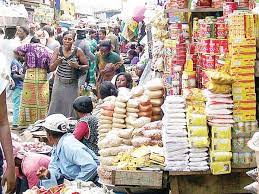According to the Consumer Price Index (CPI) report by the National Bureau of Statistics (NBS), the inflation rate in November rose by 0.72% from 33.88% recorded in October. On a year-on-year basis, the headline inflation rate jumped by 6.40% compared to November 2023, when it stood at 28.20%. Food inflation, a major driver of the crisis, surged to 39.93% in November, up from 32.84% in the same period last year.
“Prices Have Doubled,” Say Market Shoppers
Traders and shoppers across Nigeria’s bustling markets are already feeling the pinch. For many, the traditional Christmas feast may be out of reach.
Join our WhatsApp Channel“The price of rice has doubled. Last year, I bought a 50kg bag of rice for N35,000, but now it’s over N70,000,” lamented Blessing Eze, a mother of four in Lagos. “Even chicken is expensive. Live chicken is sold for N17,000 now. It’s like Christmas is not for poor people anymore.”
Her sentiment is echoed by Chinedu Okoro, a trader in Isolo. “People are no longer buying in bulk. They come to buy in small portions because everything is just too costly,” he said. “This is the worst I’ve seen in years.”
Experts Weigh In on Inflation’s Impact
Economic experts have linked the inflation surge to several factors, including the high cost of fuel, the depreciation of the naira, and disruptions in the food supply chain.
“The increase in transportation costs caused by higher fuel prices has affected every sector of the economy,” said Dr. Ifeanyi Ogbonna, an economist “When transportation costs go up, it’s only a matter of time before food prices follow.”
READ ALSO: Inflation Hits 28-Year High Of 34.6% On Food, Energy Costs
Financial analyst Funmi Adeoye added, “With inflation at 34.60%, household purchasing power is severely eroded. Many families will prioritise essential bills over Christmas celebrations.” She warned that if inflation continues at this rate, it could affect consumer confidence and reduce spending during the holidays.
Households Struggling to Make Ends Meet
The sharp rise in food prices has left many families unable to afford Christmas essentials. The NBS report revealed that key food items like yam, maize, rice, and vegetable oil experienced significant price hikes.
“I’ve had to remove chicken from our Christmas menu this year,” said Adebayo Kazeem, a Tricycle driver in Ajao Estate, Lagos. “I do not make good gain like last year, but food prices keep going up. This is not the Christmas I wanted for my children.”
Another resident, Maryam Bello, a school teacher, noted that her monthly salary is no longer sufficient. “I’ve started buying foodstuff in bits. I used to cook big meals for Christmas, but this year, we’ll have to manage with whatever we have,” she said.
What Does This Mean for the Christmas Economy?
With inflation rates skyrocketing, retailers and business owners are also bracing for a drop in consumer spending this Christmas. In past years, the festive season was a time for increased commercial activity, but 2024 appears to be different.
“Sales have slowed down,” said Kelechi Ibeh, a clothing retailer in Oshodi. “People no longer buy clothes for Christmas. They’re more concerned with food. We used to have a lot of customers at this time of the year, but now, most people are just window shopping.”
The NBS data shows that urban inflation rose to 37.10% in November from 30.21% in November 2023, while rural inflation climbed to 32.27% from 26.43% over the same period. This means both city dwellers and rural communities are feeling the strain, especially since food and housing costs make up a significant portion of household expenses.
How Can Nigerians Cope With the Crisis?
Economic experts recommend that households adopt cost-cutting measures, plan meals in advance, and prioritise essential purchases. Financial analyst Funmi Adeoye advises, “It’s important for families to plan their shopping and avoid impulse purchases. Bulk buying, when possible, can also help reduce costs.”
For some, however, even cost-cutting may not be enough. “How do you save money when you don’t have it in the first place?” asked Adebayo Kazeem. “We’re all just surviving.”
With Nigeria’s inflation rate reaching 34.60%, families are preparing for a challenging Christmas. Food prices have soared, household budgets are stretched, and the festive cheer that usually marks the end of the year is in short supply. For many, this year’s Christmas may not be merry.
As Dr. Ifeanyi Ogbonna put it, “The only way out of this is for the government to address the root causes of inflation and stabilise the economy.” For now, however, it seems that Nigerians will have to endure a holiday season shaped by higher prices and limited spending power.
Emmanuel Ochayi is a journalist. He is a graduate of the University of Lagos, School of first choice and the nations pride. Emmanuel is keen on exploring writing angles in different areas, including Business, climate change, politics, Education, and others.


















Follow Us